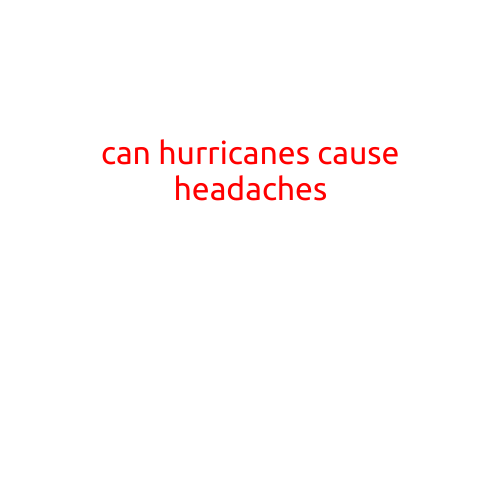
Can Hurricanes Cause Headaches?
Hurricanes, powerful storms that bring strong winds and heavy rainfall, can wreak havoc on communities and disrupt daily life. While the physical destruction caused by these storms is often the most concerning aspect, many people are left wondering about the potential impact on their health. Specifically, can hurricanes cause headaches?
Understanding the Connection
Research suggests that hurricanes can, in fact, lead to headaches in some individuals. There are several reasons for this:
- Changes in Air Pressure: Hurricanes are characterized by a significant drop in air pressure, which can cause changes in the body’s physiological responses. This can lead to headaches, particularly those affected by migraines.
- Increased Stress and Anxiety: The threat of a hurricane and the subsequent trauma caused by the storm can lead to increased stress levels, which are a common trigger for headaches.
- Disruption to Daily Routines: Hurricanes often disrupt daily routines, causing people to alter their normal habits and environments. This can lead to fatigue, stress, and increased sensitivity to environmental stimuli, including light, sound, and smells, which can all contribute to headaches.
- Water Quality Concerns: In the aftermath of a hurricane, water quality can become compromised due to flooding, power outages, and damaged infrastructure. This can lead to exposure to contaminated water, which can cause headaches, nausea, and other adverse health effects.
Types of Headaches Caused by Hurricanes
Research has identified several types of headaches that can be triggered by hurricanes, including:
- Migraines: The changes in air pressure and stress caused by hurricanes can trigger migraines in individuals who are prone to these types of headaches.
- Tension Headaches: The increased stress, anxiety, and physical discomfort caused by hurricanes can lead to tension headaches, characterized by a feeling of tightness or pressure in the forehead and scalp.
- Rebound Headaches: The use of pain-relieving medications to manage headaches caused by hurricanes can lead to rebound headaches, which are headaches caused by the withdrawal of these medications.
Preventing Headaches During Hurricanes
While it’s impossible to eliminate the risk of headaches entirely, there are several steps you can take to reduce your risk:
- Stay Informed: Keep up-to-date with hurricane tracking and weather forecasts to better prepare yourself for the storm.
- Maintain a Healthy Lifestyle: Practice stress-reducing techniques, such as meditation and deep breathing, and ensure you’re getting enough rest and exercise.
- Manage Your Stress: Identify your personal stress triggers and develop coping strategies to manage them.
- Stay Hydrated: Drink plenty of water to stay hydrated, especially during power outages or when access to clean water is limited.
Conclusion
While hurricanes can cause headaches, it’s essential to remember that these storms can also have long-term, severe consequences for physical and mental health. By taking steps to prepare, manage stress, and stay informed, you can reduce your risk of headaches and prioritize your overall well-being during and after a hurricane.





